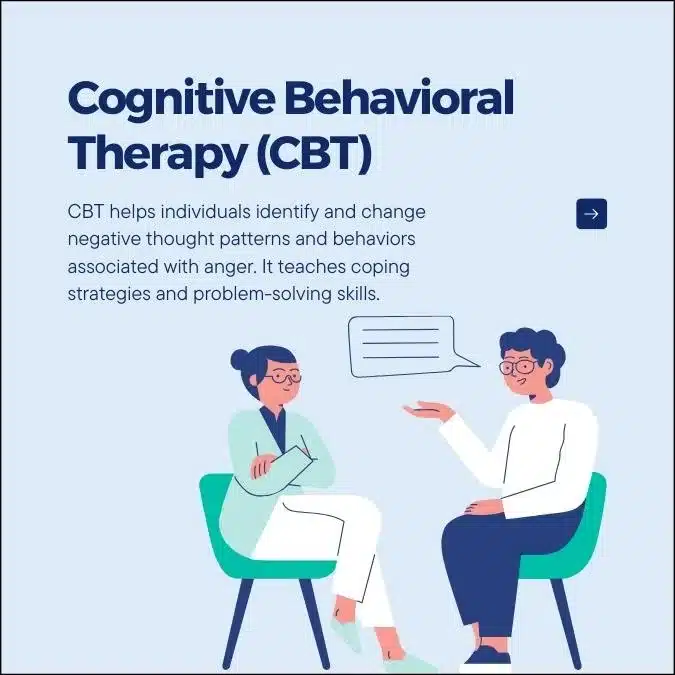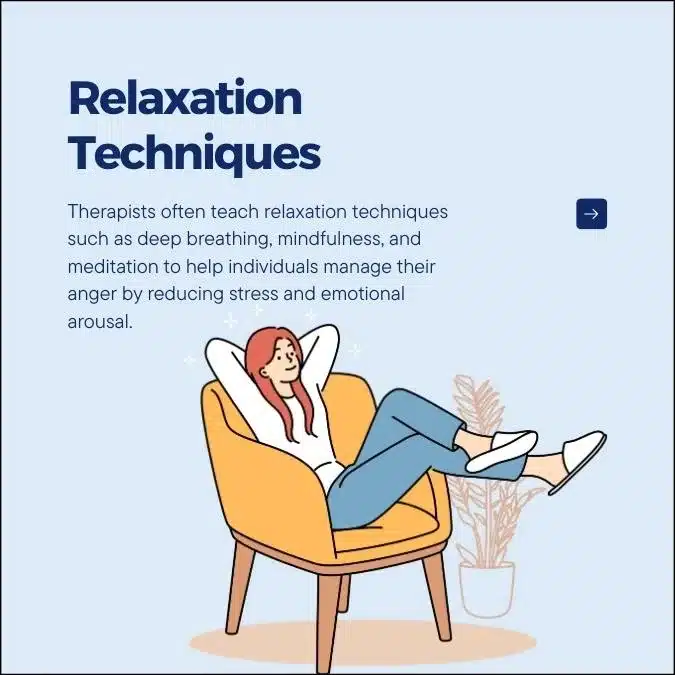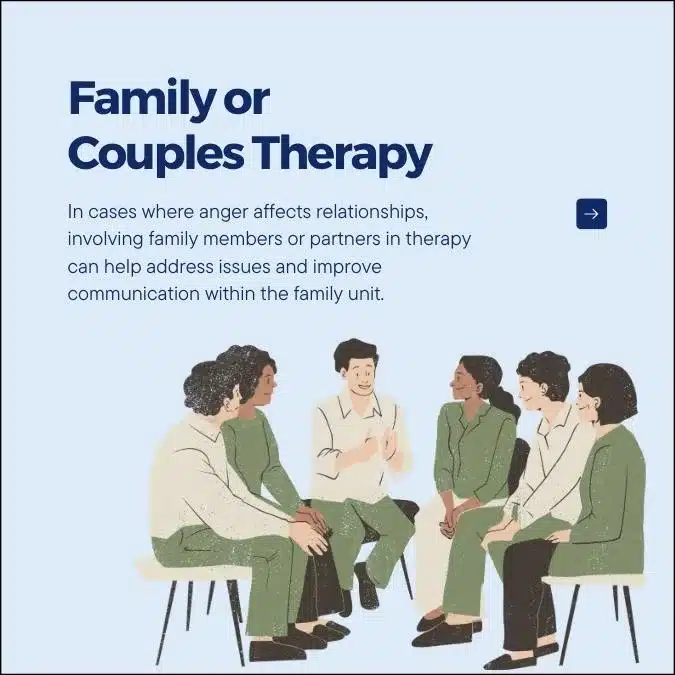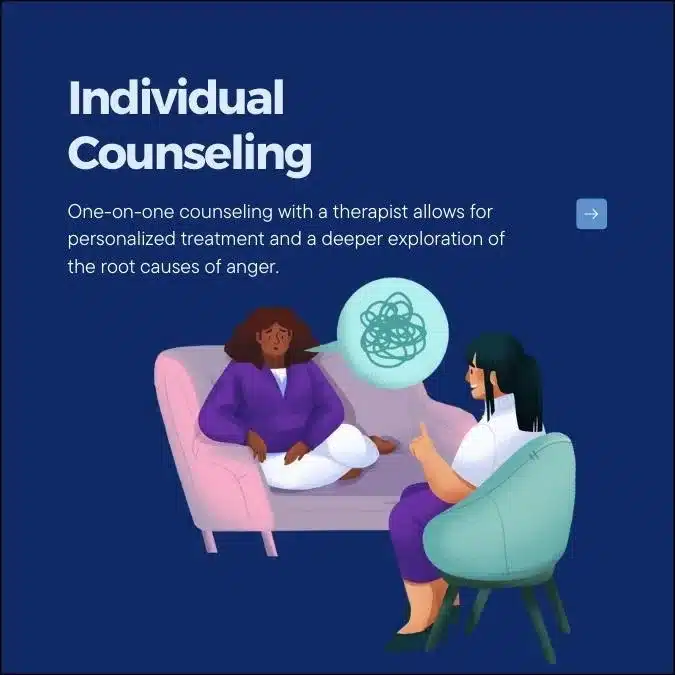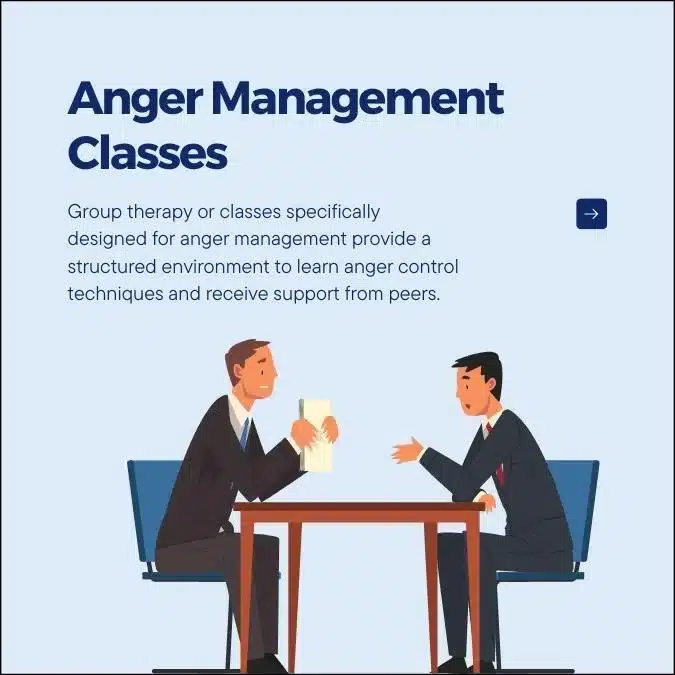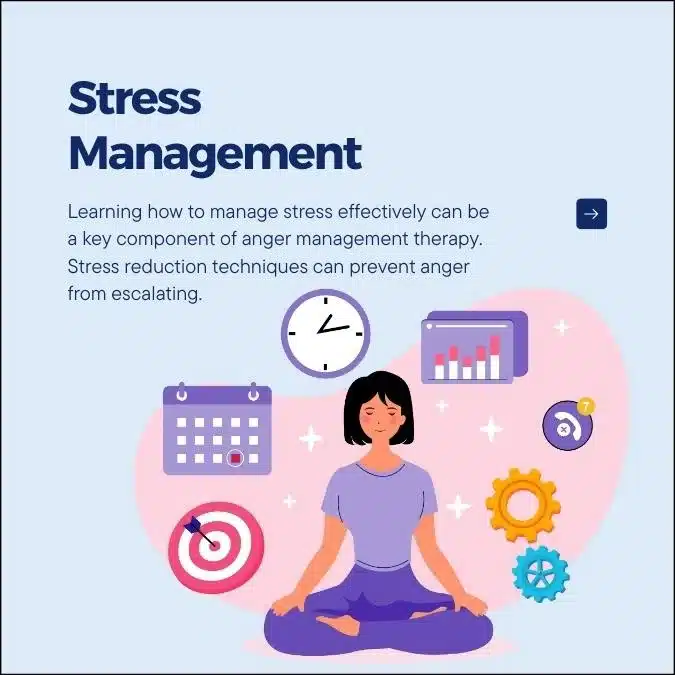|
Getting your Trinity Audio player ready...
|
If you’ve landed on this page, chances are, you’re looking for a solution to understand, process, and perhaps manage those fiery emotions that sometimes take the driver’s seat.
Anger, while a natural emotion, can be daunting when it overpowers our daily lives.
Enter the world of therapy! Now, you might be wondering, what’s the best type of therapy for anger management?
It’s a common question, and trust me, you’re not alone in seeking the answer.
The best type of therapy for anger management is often a blend tailored to the unique individual, but some tried and tested approaches shine brightly in this realm.
Join me as we delve deeper into understanding these therapeutic methods, shedding light on techniques that not only manage anger but transform it into constructive energy.
Get ready to embrace a calmer, more centered version of yourself.
The Journey Towards Calm
Navigating our emotions, especially the fierier ones like anger, can be like walking through a maze.
One minute, you think you’ve got it under control, and the next, you’re lost in a labyrinth of frustration.
But don’t despair!
The world of therapy offers numerous avenues to guide you back to tranquility.
Let’s uncover the best type of therapy for anger management that could be your guiding star.
1. Cognitive Behavioral Therapy (CBT):
Ever found yourself in a spiral of negative thoughts, where one angry emotion just leads to another?
It’s a tough place to be.
Enter Cognitive Behavioral Therapy, popularly known as CBT.
This therapy superstar is often dubbed the best type of therapy for anger management, and for good reason!
Imagine being able to rewire your brain, trading those pesky negative thought loops for more constructive ones. That’s CBT in action.
It’s not about ignoring anger but channeling it differently.
Instead of getting swept up in the heat of the moment, CBT arms you with strategies to assess situations with a clear mind.
The real charm of CBT? It gives you the tools to become your own therapist in challenging situations.
By dissecting and understanding your reactions, you get to be in the driver’s seat, steering away from rising anger and towards calm responses.
So, the next time you feel that familiar heat of anger rising, remember CBT might just be your cool companion on the road to tranquility.
2. Mindfulness and Meditation:
Have you ever found yourself in a whirlwind of emotions, just wishing for an escape button?
Enter the serene world of mindfulness and meditation.
Breathe in… feel the air fill your lungs. Breathe out… feel the weight of anger gently lifting.
It sounds simple, right? But this age-old practice is one of nature’s best-kept secrets.
Especially in our fast-paced modern world, taking a moment to be simple can work wonders.
Mindfulness teaches us to be present, to truly immerse ourselves in the now. Instead of getting tangled in the web of anger-triggering thoughts, you learn to observe them, almost like watching clouds pass by.
Meditation, on the other hand, is your personal sanctuary. A space where you can retreat, reflect, and release.
Read: Can Science Really Teach You How to Forgive?
And the best part? It’s always with you, waiting to be tapped into.
So, the next time anger starts clouding your vision, remember: mindfulness and meditation can be the lighthouse guiding you back to serenity.
Dive in and discover the peace that’s been within you all along.
3. Group Therapy:
Ever felt isolated in your emotions? Enter group therapy – a beacon of hope and solidarity.
One of the wonders of group therapy is the realization that “Hey, I’m not the only one feeling this way!”
There’s something truly empowering about being in a room filled with people who get it.
Sharing your journey, listening to others, and drawing strength from collective experiences make this an excellent pick for anger management.
Every story you hear offers new insights, every shared technique, and a potential solution.
Plus, the mutual support and understanding in the group foster a nurturing environment.
So, if you’re on the quest to manage your anger, remember: in group therapy, every voice adds value, including yours. Together, everyone achieves more!
4. Art Therapy:
Creative souls! Have you ever tried painting your anger?
Sounds unusual, right? But it’s incredibly therapeutic!
Art therapy is like a colorful bridge between your emotions and expression.
It’s not always about words. Sometimes, a splash of red or a fierce dance move captures your feelings better than a lengthy monologue.
Read: 10 Powerful Life-Changing Lessons to Learn From Buddha
Whether it’s molding clay with fervor or sketching with intensity, each stroke becomes a reflection of your inner turmoil.
And the best part? You don’t need to be Picasso! It’s all about pouring your heart out, uninhibited.
As the paintbrush moves or the clay takes shape, many find a sense of calm sneaking in.
In art therapy, every creation is a step closer to understanding and managing that fiery temper.
So, why not give it a whirl? Paint, sculpt, dance – let art be your tranquil anchor.
5. Biofeedback and Neurofeedback:
Have you ever wondered what happens inside our brains during those intense bursts of anger?
It’s like a wild, energetic dance of neurons. But what if we could “see” and even “tune” this dance?
Enter Biofeedback and Neurofeedback – the modern marvels of therapy.
These therapies aren’t just about talking; they’re about visualizing.
By monitoring brain activities in real-time, they showcase what triggers our fiery responses.
Imagine wearing headphones that allow you to hear your brain’s orchestra.
And then, using this insight, you learn to be the conductor of this orchestra.
Cool, right? By understanding the rhythms and patterns, we can train ourselves to change the tune when anger strikes.
So next time anger bubbles up, remember – with the right techniques, you can “change your mind!”
6. Talk Therapy:
Picture this: A cozy room, two chairs, and an atmosphere of trust.
There are no judgments, just understanding. Sounds comforting, right? That’s the essence of talk therapy.
Often, our anger is like a tangled ball of yarn, each thread representing an underlying issue.
Talk therapy provides the space and guidance to slowly unravel these threads.
It’s like conversing with a friend who listens and truly “gets” it.
By diving deep into our emotions and past experiences, we discover the ‘why’ behind the ‘roar.’ With each session, the heavy weight of unresolved feelings begins to lift, making way for clarity and calm.
Ultimately, sometimes, all it takes to tame the fire of anger is a simple chat.
So, if you’re feeling overwhelmed, remember, there’s power in talking it out!
7. Anger Management Classes:
Imagine a class where the main syllabus is ‘You.’ Yes, you read that right!
Anger management classes aren’t your typical lecture sessions.
They are vibrant, interactive hubs of learning. Here, you’ll uncover the roots of your rage and learn effective strategies to manage it.
These classes are structured, breaking down the vast topic of anger into bite-sized, digestible chunks.
Think of them as workshops where you get hands-on experience in dealing with fury. You’ll experience a blend of techniques tailored to diverse needs, from breathing exercises to role-playing scenarios.
And the best part? Being in a group setting lets you see you’re not alone in this journey.
There’s a shared sense of purpose, camaraderie, and understanding.
If you’ve ever thought, “Is there a comprehensive guide to handling my anger?”
Well, anger management classes might be your answer for the best type of therapy for anger management
8. Dialectical Behavior Therapy (DBT):
Ever felt like your anger was a wild, untamed river, rushing and unpredictable?
Enter DBT, your guiding compass.
DBT isn’t just therapy; it’s a blend of cognitive-behavioral approaches infused with mindful practices. Imagine it as a bridge, linking acceptance and change.
The goal? To ground you, giving you the tools to navigate the storm of emotions.
While CBT focuses on altering negative thought patterns, DBT takes it a step further.
It instills mindfulness, teaching you to be fully present in the moment.
By understanding your triggers, acknowledging them, and then redirecting your response, DBT becomes a transformative experience.
So, the next time anger threatens to sweep you away, remember that with DBT, you have an anchor: an anchor of calm, acceptance, and clarity.
Final Thoughts on Therapy For Anger Management
Anger, in its essence, isn’t the enemy. It’s a natural emotion, a signpost on the intricate map of our feelings.
The true challenge lies not in its existence but in our response to it.
The journey of managing anger is much like learning to drive on a bustling highway.
With the right tools and therapies, like the trusted GPS systems guiding our way, we can navigate through traffic snarls and roadblocks.
Whether you find solace in CBT, the serenity of mindfulness, or the communal support of group therapy, the route you choose is personal and unique for the best type of therapy for anger management.
So, as you journey forward, remember: Every moment of frustration is also an opportunity, a chance to learn, grow, and steer towards a calmer, more centered you.
Safe travels on your road to self-discovery and emotional balance!
For more empowering content, connect with our vibrant community here ➡️ Social Media.

